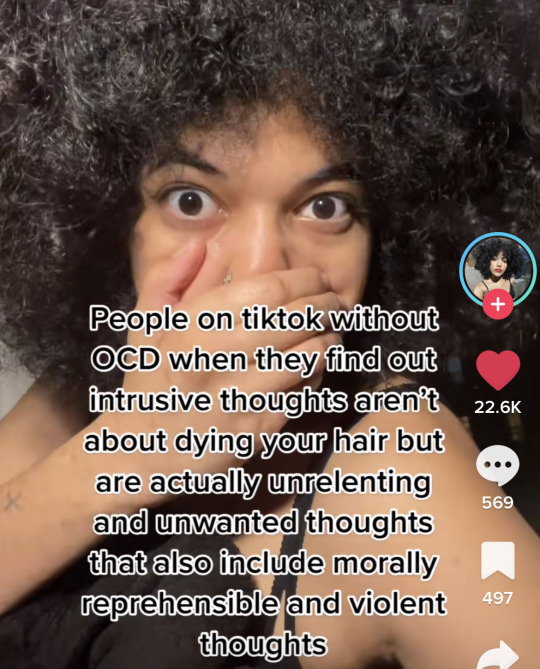Text
One thing I don't see talked about in the media is how comorbid disorders work with each other. Because they can both make each other worse and better.
We have comorbid BPD (borderline personality disorder) and PPD (paranoid personality disorder), and they very often "work together," so to speak. One starts going on about abandonment, the other backs it up by reminding us that we can never trust anybody, and how can we really know if people aren't doing something behind our back? (And yes, I am talking about them like they are toddler friends)
But just as much as they are working together in their usual destructive manner, they also, surprisingly, calm each other down.
BPD is mirroring other people's behaviors. If the behavior of another person is stable, then we are stable ourselves. If we genuinely see people loving us and communicating with us, being open about their emotions, solving arguments and problems in a healthy, calm, adult-like way, and handling our splits and episodes in a loving way (@the-soup-system), our BPD calms down and goes: "Hm. Maybe they won't abandon us, and maybe they do actually love us! Also, they're so stable, I don't have to walk on eggshells around them. So I'm stable!" And PPD, looking at BPD (metaphorical look), even if it starts going, "but we don't know if it's actually like that!" calms down with our BPD. If there is no reason for abandonment, and if we're stable in mood, then maybe there's no reason to suspect anything else. And vice versa. Both BPD and PPD respond well to other people being open, honest, calm, and loving. So if one has no reason to suspect or fear anything, the other one automatically wouldn't, too.
Some other disorders we have that are comorbid with each other, like OCD and a few others, also work with each other well. Oftentimes, we actually use OCD to calm our other disorders down because if OCD is calm, then others will also slowly calm down with it. The way we do it is by playing organizing games, which we downloaded specifically to calm ourselves down. Just OCD going off? Organizing games that would help it. For autism, those games are patterns. OCD and anxiety disorders are very much comorbid, so these games calm down our anxiety, too.
What I'm saying is, I think the second we started treating disorders like they are a bunch of toddlers who just need to be heard, we figured out who they metaphorically look up to and follow. Comorbid disorders are connected one way or another, and by calming one down, there is a good chance the other one will calm down, too. It's almost the same thing as looking at healthy coping mechanisms and needs for both disorders, but I kinda put it in a different perspective. Obviously, personality disorders or just disorders don't actually follow anybody, but they act like they do, and they affect who you are as a person. When you start working with them, what they need to be is heard and reassured. They have their own needs.
And now realize that I described them as different people who you need to take care of, but all of them are actually you, however many personalities you have. It's you who needs to be heard and reassured, it's you who has your needs.
I suppose the moral of this post is that you don't have to calm every disorder down individually, and their comorbidity might help you more than destroy you. And if you have trouble understanding how to deal with them and help them, imagine them as separate people, preferably toddlers or children, with a desire to be heard, reassured, and for their needs to be met.
#did system#did osdd#did#cdid system#cdid#osdd 1a#osdd 1b#osdd system#osdd#complex dissociative identity disorder#other specified dissociative disorder#dissociative identity disorder#comorbid conditions#comorbidities#actually bpd#bpd#actually ocd#ocd#actually ppd#ppd#actually borderline#borderline personality disorder#borderline pd#actually obsessive#obsessive compulsive disorder#paranoid#paranoia#paranoid personality disorder#actually paranoid#paranoid pd
142 notes
·
View notes
Text
Having OCD is trying to choose between two completely identical spoons because you're spiritual and don't know which one to grab to not fuck up the future.
-host
#ocd tag#ocd#obsessive thoughts#obsessive compulsive disorder#intrusive thoughts#intrusive images#obsessive compulsive behavior#obsessive compulsive spectrum#mental health#mental illness
43 notes
·
View notes
Text
i am once again asking people i know to do actual research on OCD and what it is b/c i saw someone equating POCD to actual predatory shit recently and i think im going to break out of my enclosure . OCD is not about “subconscious desires” it’s about fear. fears, aversions and repulsions, both subconscious and conscious. OCD forces you to obsess over things that make you anxious, scared, uncomfortable, or disgusted. possibilities (about yourself, your future, your loved ones and their futures, etc) that would give you nightmares if you considered them for too long. literally the second you start thinking OCD may be about “subconscious desires” you have lost. you made an immediate left turn when you were supposed to make a right and now you’re on a completely different road. this applies to all forms of OCD by the way, even the most “disgusting”, taboo or “disturbing”. whichever form of OCD you’re thinking may be an exception to this rule, is not an exception. b/c there is none
36K notes
·
View notes
Text

64K notes
·
View notes